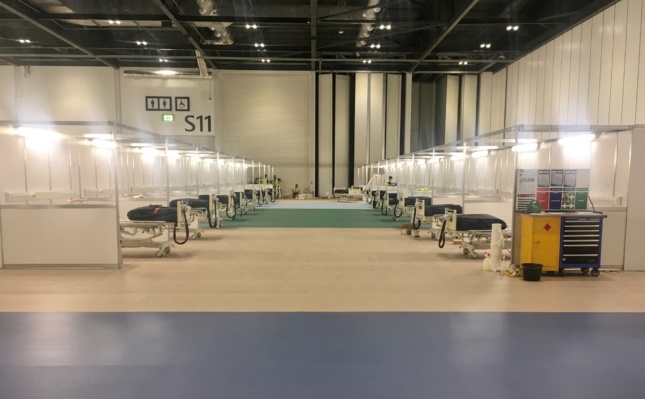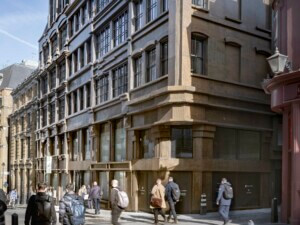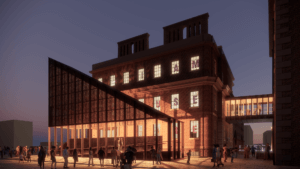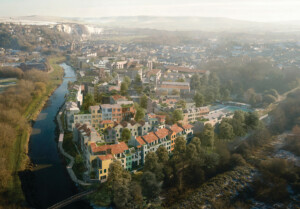NHS Nightingale Hospital London, an emergency medical facility dedicated to treating patients infected with the novel coronavirus (COVID-19), opened late last week within the normally conventioneer-stuffed halls of the ExCeL London exhibition center following a super-expeditious retrofit.
Thanks to a herculean collaborative effort carried out by the National Health Service (NHS), the British Armed Forces, the Royal Engineers, the facilities management team at ExCeL London, private contractors, and international architecture firm BDP, the 1-million-square-foot convention center in the docklands of East London has been transformed in just over a week into what’s not only the largest hospital in the United Kingdom but, per CNBC, the largest critical care unit in the world.
BDP project leads Paul Johnson, architect director, and James Hepburn, engineering principal, described the process in a statement as “a monumental team effort which has been intense and exhausting.”
The makeshift facility has room for 4,000- to-5,000 ventilator-equipped beds spread out between 78 different wards, each named after a famed British healthcare figure, as well as two morgues according to The Evening Standard. The hospital is currently operating with 500 beds and will expand as needed.
“It’s nothing short of extraordinary that this new hospital in London has been established from scratch in less than a fortnight, said Sir Simon Stevens, NHS chief executive, in a press statement. “The NHS, working with the military, has done in a matter of days what usually takes years.”
Prince Charles, who is currently in Scotland recovering after he tested positive for COVID -19 at the end of March, opened the NHS Nightingale London via Skype on April 3. He noted: “In this dark time, this place will be a shining light.”
At the time of writing, there have been 48,440 confirmed cases of coronavirus in the United Kingdom and 4,934 known deaths. In addition to Prince Charles, other prominent British figures who have contracted the virus include Prime Minister Boris Johnson and a growing handful of film and television personalities, athletes, and beloved cultural icons.
London’s makeshift mega-hospital is the first of what are to be several NHS field hospitals spread out across England with others soon to open in Birmingham, Bristol, Manchester, and Harrogate, Yorkshire. All will uniformly carry the Nightingale name in honor of trailblazing hygiene evangelist and Crimean War nurse extraordinaire, Florence Nightingale. Outside of England, NHS-operated pop-up hospitals are also in the works for Glasgow, Belfast, and Cardiff. ExCeL London’s Abu Dhabi-based owner was originally set to charge the NHS a hefty monthly sum for use of the space but has since reconsidered.
While ExCel London certainly isn’t the first convention center or arena in Europe or elsewhere to be repurposed into a temporary hospital during the COVID-19 pandemic, the staggering size of the conversion and the speed at which it was completed are, as noted by Prince Charles, remarkable.
Also remarkable is the all-hands-on-deck approach instituted at Nightingale London and future NHS field hospitals. In addition to helping to build-out the facilities, military personnel have been enlisted by the NHS to join civilian first responders in ferrying patients via ambulance to the hospitals. Furloughed cabin crew members with airlines easyJet and Virgin Atlantic—many of them first aid-trained and security-cleared—have also been summoned by their employers to change beds and perform non-clinical support tasks at NHS Nightingale London and other NHS field hospitals.

As for the conversion of ExCeL London into the world’s largest critical care facility, Manchester-headquartered BDP has been eager to share its adaptive design approach in hopes that it can be replicated elsewhere if need be. To help illustrate how it was done, the firm has published a poster-sized, IKEA-esque instruction manual.
We have collated the different concepts that have been adopted for the #NHSNightingale Hospital, so that information can be disseminated quickly across the UK and globally. Solutions will differ for different sites but this shows the strategies based on the programme at ExCeL pic.twitter.com/LiJCAsCFAF
— BDP (@bdp_com) April 1, 2020
“Delivering emergency hospital facilities in conference and exhibition centres is unprecedented, so we have been drawing on our previous experience of designing large-scale healthcare facilities including very large intensive-care units in super-speciality tertiary hospitals like Queen Elizabeth Hospital, Birmingham,” said BDP’s Hepburn in a statement. “However, it is the scale, timeframe and purpose of this emergency facility that distinguishes it from any previous healthcare projects.”
The firm elaborates on the nuts and bolts of the rapidly implemented design its website:
“The bed heads and service corridors were constructed from a component system that is usually used to construct exhibition stands and there was some simple reinforcement to allow services to be fitted to the walls. Minimal building intervention enabled maximum use of the building’s assets.
“Clinical flows determined the circulation strategy within the building. The wards are linked with a temporary tunnel across a boulevard which allows connection to the diagnostics area. Staff move from the boulevard to and from the ICU wards via the don and doff rooms, allowing PPE to be donned and doffed, which is key to infection control.”
Per the NHS, 33,000 beds in existing hospitals have been freed up to accommodate an influx of COVID-stricken patients. This is the equivalent of opening 50 new hospitals, although this comparison, as some have pointed out, is a bit weak. “These measures mean that capacity still exists in hospitals to deal with coronavirus, with the Nightingales standing ready if local services need them beyond that,” explained the NHS.











